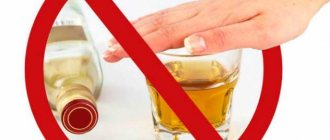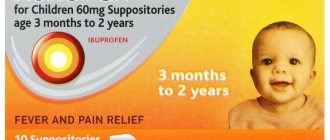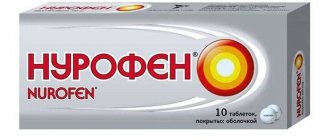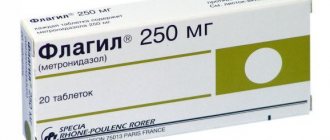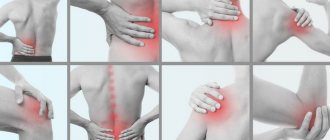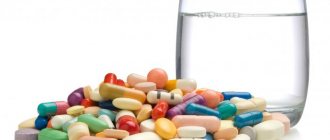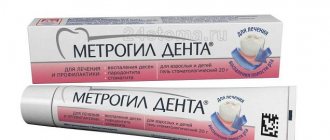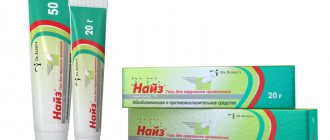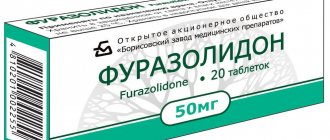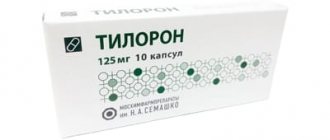Nurofen gel is included in the clinical and pharmacological group of non-steroidal anti-inflammatory drugs (NSAIDs). It is used in the treatment of diseases of the joints, spine, and tendon-ligamentous apparatus. The drug is recommended for patients with injuries - bruises, dislocations, sprains. The Nurofen gel contains ibuprofen, which exhibits anti-inflammatory, analgesic and antipyretic activity. Using the product for local application helps to quickly eliminate pain, swelling, morning swelling of the joints and stiffness of movement.
Release form
Nurofen tablets and gel are produced. The tablets are covered with a white coating, they are round in shape, biconvex. The tablets have a black Nurofen imprint on one side. When cut, the tablet is white or almost white. The blister can contain 6, 8, 10 or 12 tablets.
The drug is also available in the form of a gel, which is used externally. The gel is colorless, transparent or slightly opalescent. This is a homogeneous substance that has a characteristic odor of isopropyl alcohol. Contained in aluminum tubes of 30, 50 or 100 g.
pharmachologic effect
The abstract indicates that Nurofen is a non-steroidal anti-inflammatory drug. It acts as anti-inflammatory and analgesic . The antipyretic effect is less pronounced. The active substance in the body indiscriminately blocks COX-1 and COX-2.
Ibuprofen inhibits the synthesis of prostaglandins, which are mediators of inflammation, pain, and hyperthermic reaction.
Wikipedia provides information that the drug has the ability to stimulate the production of endogenous interferon .
Consequently, it has a positive effect on the function of the immune system and improves the expression of the body’s nonspecific defense, while acting as an antipyretic and analgesic.
Drug interactions
Caution should be exercised when using Nurofen gel in combination with anticoagulants and thrombolytic drugs. Its combined use with drugs to lower blood pressure may reduce their clinical effectiveness.
Simultaneous use of the gel with other non-steroidal anti-inflammatory drugs, including acetylsalicylic acid, can lead to increased and prolonged adverse reactions. You should inform your doctor that Nurofen is being used if he is prescribing an NSAID to treat another disease, such as ARVI or influenza.
Indications for use
The following indications for the use of Nurofen are determined:
- rheumatoid diseases (deforming osteoarthritis , rheumatoid arthritis , rheumatism, ankylosing spondylitis, exacerbation of gout and other rheumatoid diseases in which articular syndrome is noted);
- severe pain syndrome, in which damage to the peripheral nervous system is noted;
- fever patients with infectious and inflammatory diseases;
- infectious-inflammatory or pain process in patients with adnexitis , diseases of the ENT organs, algodismenorrhea;
- for toothache, migraine, headache .
It is advisable to use Nurofen ointment for the following diseases and conditions:
- backache;
- myalgia;
- neuralgia;
- sports injuries;
- arthritis;
- stretching.
Contraindications
There are some contraindications for adult patients and children. Nurofen tablets should not be taken in the following cases:
- ulcerative and erosive lesions of the gastrointestinal tract during exacerbation, Crohn's disease, peptic ulcer, ulcerative colitis ;
- heart failure;
- severe arterial hypertension;
- intolerance to acetylsalicylic acid, complete or incomplete, which causes urticaria , rhinosinusitis , bronchial asthma , nasal polyps;
- deficiency of glucose-6-phosphate dehydrogenase;
- optic nerve diseases, scotoma , amblyopia , color vision impairment;
- severe impairment of liver and kidney function;
- hemophilia, as well as other bleeding disorders ;
- postoperative period after coronary artery bypass surgery;
- hearing impairment, pathology of the vestibular apparatus;
- gastrointestinal bleeding;
- intracranial hemorrhages;
- last trimester of pregnancy and breastfeeding ;
- child's age up to 6 years;
- high sensitivity to the active substance and other components of the drug.
Nurofen tablets should be taken with caution by people with dyslipidemia, coronary artery disease, diabetes , cerebrovascular diseases, severe somatic diseases, peripheral arterial diseases, liver cirrhosis , bronchial asthma , etc.
The gel should not be used by people who suffer from urticaria , bronchial asthma, rhinitis (if these symptoms occur when taking acetylsalicylic acid). It is also not used for children under 12 years of age or for people with high sensitivity to the components of the medication.
Side effects
If the drug is used for toothache during menstruation or for fever for several days, practically no side effects are observed. With prolonged use of the medicine, the following side effects may develop:
- digestive system: heartburn , vomiting, pain in the epigastrium, anorexia, flatulence , diarrhea , erosions and ulcers of the gastrointestinal tract, dry mucous membranes, constipation , pain in the mouth, hepatitis, pancreatitis , aphthous stomatitis ;
- nervous system: insomnia , headache , drowsiness , dizziness , hallucinations , depression , disturbances of consciousness, agitation;
- cardiovascular system: tachycardia , heart failure, increased blood pressure ;
- hematopoietic system: thrombocytopenia, anemia, agranulocytosis, thrombocytopenic purpura, leukopenia;
- urinary system: acute renal failure cystitis , polyuria, nephrotic syndrome;
- sense organs: hearing impairment, tinnitus, blurred vision, diplopia, swelling of the eyelids and conjunctiva, reversible optic neuritis;
- allergy manifestations: skin itching , urticaria, anaphylactoid reactions, angioedema , exudative erythema, fever , allergic rhinitis , eosinophilia, toxic epidermal necrolysis;
- respiratory system: shortness of breath , bronchospasm;
- other manifestations: heavy sweating .
If the patient takes the drug for a long time, he may develop ulceration of the gastrointestinal mucosa, possibly bleeding, and visual impairment.
If the side effects described above occur, you should stop taking the drug and consult a specialist.
When using Nurofen gel, minor reddening of the skin, tingling and burning sensation may be observed as side effects. In rare cases, bronchospasm and allergic reactions .
Instructions for use of Nurofen (Method and dosage)
The drug should be used as prescribed by a doctor.
Nurofen tablets, instructions for use
The drug in tablets for children over 12 years of age and adults is prescribed at a dose of 200 mg 3-4 times a day. You need to take the tablets after meals. To get a quick effect, the dose is sometimes increased to 400 mg, it should be taken 3 times a day. If Nurofen is prescribed to children aged 6 to 12 years, then the following dosage should be followed: 200 mg no more than four times a day. This drug, like Nurofen capsules, is prescribed only to children whose weight is 20 kg or more. In this case, the interval must be at least 6 hours. If the patient does not feel improvement within 2-3 days of treatment, you should consult a doctor.
Gel Nurofen, instructions for use
The ointment is used for external use; it is indicated only for patients over 12 years of age and adults. A single dose of the product is 50-125 mg of ibuprofen, that is, 4-10 cm of gel. The product can be used no more than 4 times a day, and the interval between uses should be at least 4 hours. If after two weeks of use there is no improvement, the drug should be discontinued. Rub the product into the skin until completely absorbed.
Dosage regimen
Before first use, you should check the integrity of the protective foil on the neck of the tube. To open it, you can use the protrusion on the outer surface of the screw cap. Single doses of the drug vary depending on the area of pain and inflammation. The approximate amount of gel for a single application is equal to 5 cm of strip squeezed out of the tube. During the day, the drug can be used no more than 4 times. A four-hour interval should be maintained between applications.
For better absorption of ingredients, the gel should be rubbed into the skin with massaging movements. You should wash your hands with soap after each application. The duration of the therapeutic course is 10-20 days. If after two weeks of use the symptoms persist or have weakened slightly, you should consult a doctor. He will adjust the dosage regimen or replace Nurofen with a more effective analogue.
Nonsteroidal anti-inflammatory drugs are often combined with chondroprotectors for local or systemic use. As they accumulate in the joint cavity, products containing chondroitin and glucosamine begin to have an anti-inflammatory and analgesic effect. A few days after the start of treatment, the dose of NSAIDs is gradually reduced.
Overdose
An overdose of the drug in tablets can lead to drowsiness , lethargy, gastrointestinal dysfunction, headache , depression , acute renal and liver failure , metabolic acidosis , bleeding, decreased blood pressure, bradycardia , tachycardia , etc.
If the dosage has been exceeded, it is necessary to rinse the stomach (the method is more effective within one hour after taking the tablets), take activated charcoal , practice forced diuresis, alkaline drinking and the necessary treatment. If the patient exhibits seizures, anticonvulsants should be taken.
Rules for storing Nurofen in pharmacies and clinics
The storage and sale of medicines in specialized institutions is regulated by law. The prescribed conditions concern:
- storage rooms;
- interior decoration;
- equipment;
- humidity and temperature indicators;
- access to premises.
According to the regulations of March 1, 2021, Federal Law No. 61 “On the Circulation of Medicines”, the following rules apply:
- The complex of premises for storing medicines must include a receiving area; sampling and sampling area; quarantine storage area; a special area for storing drugs that require special storage conditions.
- The finishing of the premises must be carried out in accordance with current hygienic and sanitary requirements.
- The following equipment must be available on the premises of the institution: air conditioners; refrigeration equipment; temperature and humidity recorders; video surveillance and security systems; equipment for measuring air parameters.
- It is prohibited to store tobacco products, food and drinks, except water, near medications.
- Access to the premises for storing medicines by third parties who are not employees of the establishment or unauthorized persons is excluded.
After the expiration of the shelf life, the medicine, which has become unusable, should be disposed of according to standards, maintaining a certain order.
- liquid medicines are diluted with water (1 to 100) and poured into the sewer;
- soluble tablets are also dissolved in water and poured out;
- ointments and insoluble tablets are burned;
- used capsules, packaging, bottles, etc. are thrown away.
Also, special attention must be paid to transporting the drug. The main requirements here will be protection from mechanical damage; moisture and dirt ingress; if necessary, protect from sunlight. Before transportation, it is important to sanitize the vehicle.
Interaction
You should not take Nurofen and Acetylsalicylic acid, as well as other NSAIDs, at the same time. Ibuprofen reduces the antiplatelet and anti-inflammatory effects of acetylsalicylic acid. Also, in patients who take Acetylsalicylic acid as an antiplatelet agent, the incidence of acute coronary insufficiency .
The risk of bleeding increases if Nurofen and anticoagulants and thrombolytic agents are taken simultaneously.
The simultaneous use of ibuprofen and Cefoperazone , Cefamandole, Plicamycin, Cefotetan, Valproic acid increases the incidence of hypoprothrombinemia .
Ibuprofen increases the plasma concentration of Cyclosporine , and accordingly, the likelihood of hepatotoxic manifestations increases.
The simultaneous use of Cyclosporine and gold preparations increases the effect of ibuprofen on the process of prostaglandin synthesis in the kidneys, as a result, nephrotoxicity increases.
Plasma concentrations of ibuprofen increase when taking drugs that block tubular secretion.
With simultaneous administration of inducers of microsomal oxidation, the production of hydroxylated active metabolites and the risk of hepatotoxic manifestations increases.
Ibuprofen, when taken simultaneously, reduces the hypotensive effect of vasodilators, the natriuretic effect of Hydrochlorothiazide and Furosemide .
When taken together, microsomal oxidation inhibitors reduce the likelihood of hepatotoxic effects of ibuprofen.
The simultaneous use of ibuprofen and uricosuric drugs reduces the effectiveness of the latter. Ibuprofen also enhances the effectiveness of antiplatelet agents, indirect anticoagulants, and fibrinolytics.
The simultaneous use of ibuprofen and oral hypoglycemic drugs leads to an increase in the effect of the latter - insulin and sulfonylurea derivatives.
When used together, the side effects of estrogens , corticosteroids, ethanol , and mineralocorticoids .
The absorption of ibuprofen is reduced when cholestyramine and antacids are taken together.
The simultaneous use of ibuprofen and Methotrexate, lithium preparations, and Digoxine increases the concentration of the latter in the blood.
The analgesic effect of the drug is activated by caffeine.
special instructions
The manufacturer reports that with prolonged use of the drug, it is necessary to monitor laboratory parameters of peripheral blood, as well as monitor kidney and liver functions. If a person exhibits symptoms of gastropathy, careful monitoring is important, for which esophagogastroduodenoscopy , laboratory tests of blood and stool are performed.
The use of Nurofen in capsules and tablets should not be guided by advertising or promotional pictures. It is important to consult a doctor before using the product. It is the doctor who must determine whether Nurofen tablets are worth taking, and what they help with in each specific case.
If the patient needs to have 17-ketosteroids determined, Nurofen should be discontinued 48 hours before the test.
During the treatment period, you should not drive or engage in other activities that require concentration.
After using the drug in gel form, you should wash your hands thoroughly. Do not allow the product to come into contact with your lips or eyes. The gel should not be applied to damaged areas of the skin, or to the skin near the eyes and lips.
If you accidentally ingest Nurofen gel, you should definitely consult a doctor. In this case, disturbances in the functioning of the digestive system may occur.
Features of application
If the product gets into the eyes, mucous membranes of the mouth or nose, a burning sensation occurs. To eliminate it, rinse under running clean water. If you accidentally ingest the drug, you should consult a doctor. This is especially true for young children, as the likelihood of overdose and poisoning increases. Their clinical manifestations include the following symptoms:
- nausea, vomiting;
- weakness, apathy.
To neutralize the ingredients, gastric lavage with detoxification solutions is required.
The external product is combined with bandages and fixing bandages made from natural fabrics. Using the gel with airtight orthoses will cause severe skin irritation. Nurofen is also not used for occlusive sealed dressings.
The drug does not affect the reaction rate. It is used while driving vehicles and performing work that requires concentration and attention.
Nurofen should not be used before visiting a solarium or the beach due to the likelihood of skin discoloration at the application sites under the influence of ultraviolet radiation.
| Structural analogues of Nurofen gel (with identical composition) | Analogues of Nurofen gel from the group of anti-inflammatory non-steroidal drugs |
| Ibuprofen ointment | Gel Diclofenac |
| Ibuprofen-Verte ointment | Indomethacin ointment |
| Cream Dolgit | Fastum-gel |
| Gel Dolgit | Gel Voltaren |
| — | Ortofen ointment |
| — | Gel Ketoprofen |
| — | Gel Artrosilene |
| — | Gel Nise |
| — | Diklak ointment |
Nurofen gel is available over-the-counter from pharmacies. Despite this, its use without a doctor’s prescription is inappropriate. The drug is intended to reduce the severity of symptoms, but it cannot eliminate the cause of the disease. Only doctors with a narrow specialization - rheumatologists, vertebrologists, neuropathologists - can correctly treat joint pathology. After conducting a series of diagnostic studies, the doctor will draw up a treatment regimen that will help speed up recovery and avoid irreversible complications.
Nurofen's analogs
Level 4 ATC code matches:
Artrum
Brustan
Ketonal Duo
Nurofen Plus
Nurofen Express
Nurofen Forte
Nurofen Express Lady
Nurofen for children
Ibuprom
Ibuprofen
Advil
Mig 400
Has
Ketoprofen
Vimovo
Naproxen
Flexen
Nalgesin
Flamax
Novigan
Analogues of this drug are medicines that contain ibuprofen as an active ingredient. These drugs are Brufen , Nurofen Forte , Ibuprofen , Ibuuprofen-Verte , Ibuprom , Ibufen , Nurofen Ultracap , etc.
Ibufen or Nurofen - which is better?
Ibufen is a drug whose main component is also ibuprofen. It comes in the form of a suspension, so it is prescribed to children. But in each specific case, only a doctor should determine which medicine is appropriate to choose.
How to store Nurofen
The drug should be stored out of the reach of children at a temperature not exceeding +25 °C.
You can store Nurofen at home in a regular first aid kit. The most optimal conditions are in a cabinet or on a shelf, where it is always dry and dark. It is not necessary to store the drug in the refrigerator.
It is important to avoid getting moisture into the preparation, because this contributes to the breakdown of chemicals, which ultimately form substances that are harmful and toxic to humans. It is highly undesirable to store Nurofen in the bathroom or near the sink.
Analog drugs:
- Solpaflex;
- MIG 200/MIG 400;
- Sedalgin;
- Ibufen;
- Next;
- Ibusan;
- Advil;
- Ibuprofen;
- Brufen;
- AstroCan.
Reviews about Nurofen
Many reviews of Nurofen tablets indicate that the drug is effective for various types of pain. In particular, it helps against toothache and headache. The product is also effective as an antipyretic drug. Gastrointestinal problems and allergic reactions are most often mentioned as side effects in reviews. Reviews of the gel also indicate that the drug is an effective pain reliever. However, there are also reviews that write about the ineffectiveness of the product for back pain, and also mention that the gel relieves discomfort only for a short time.
Nurofen price, where to buy
The price of Nurofen in tablets is on average 175 rubles for 20 pieces. How much the tablets cost depends on the number of them in the package. You can buy a package of 10 tablets for a price of 100 rubles.
The price of Nurofen gel is on average 170 rubles. per package of 50 g. The cost of a package of 100 g is on average 300 rubles. The ointment can be bought at any pharmacy without a doctor's prescription.
- Online pharmacies in RussiaRussia
- Online pharmacies in UkraineUkraine
- Online pharmacies in KazakhstanKazakhstan
ZdravCity
- Nurofen for children susp.
for internal approx. strawberry 100mg/5ml fl. 200ml Reckitt Benckiser Healthcare International Ltd RUB 223 order - Nurofen for children susp. for internal approx. orange 100mg/5ml 150mlReckitt Benckiser Healthcare Limited
167 RUR order
- Nurofen for children susp. for internal approx. orange 100 mg/5 ml 200 ml Reckitt Benckiser Healthcare India/Reckitt Benckiser Healthcare (UK)
RUB 223 order
- Nurofen Forte tablets p.p.o. 400mg 12 pcs Reckitt Benckiser Healthcare (UK) Limited
104 rub. order
- Nurofen Express Forte capsules 400 mg 10 pcs. Patheon Softgels B.V.
210 rub. order
Pharmacy Dialogue
- Nurofen Express Neo tablets 200 mg No. 12Reckitt Benckiser
RUB 143 order
- Nurofen from 6 years old tablets 200 mg No. 8Reckitt Benckiser
104 rub. order
- Nurofen suspension Strawberry 100mg/5ml 100ml for childrenReckitt Benckiser
116 RUR order
- Nurofen tablets 200 mg No. 10 Reckitt Benckiser
86 rub. order
- Nurofen suspension Orange 100mg/5ml 150ml for childrenReckitt Benckiser
RUB 192 order
show more
Pharmacy24
- Nurofen Express 200 mg No. 24 tablets Reckitt Benckiser Healthcare International, Great Britain
120 UAH order - Nurofen Long No. 12 tablets Reckitt Benckiser Healthcare International, Great Britain
99 UAH order
- Nurofen 100 ml suspension orange for children Reckitt Benckiser Healthcare(UK)LTD, Great Britain
82 UAH order
- Nurofen Express Forte 400 mg No. 10 capsules Reckitt Benckiser Healthcare International, Great Britain
98 UAH order
- Nurofen Forte orange for children 200 mg/5 ml 100 ml suspension
104 UAH order
PaniPharmacy
- Nurofen for children forte liquid Nurofen forte suspension for children Orange 100ml UK, Reckitt Benckiser Healthcare International
107 UAH order
- Nurofen for children forte liquid Nurofen Forte suspension for children Strawberry 100ml UK, Reckitt Benckiser Healthcare (UK)
109 UAH order
- Nurofen Express Ultracap capsule Nurofen Express Ultracap capsule 200mg No. 10 UK, Reckitt Benckiser Healthcare International
84 UAH order
- Nurofen for children liquid Nurofen for children oral suspension Orange bottle 200ml UK, Reckitt Benckiser Healthcare (UK)
163 UAH order
- Nurofen express tablets Nurofen express tablets 200 mg No. 12 UK, Reckitt Benckiser Healthcare International
88 UAH order
show more
Price and analogues of the product
The price of Nurofen gel in the Russian Federation is from 150 rubles. for 50 gr. and from 300 rub. for 100 gr. How much the gel costs depends on the volume of the package. The ointment is available at any pharmacy without a doctor's prescription. If the consumer is not satisfied with the cost of the drug or has an intolerance to its components, a suitable analogue with a similar effect should be selected.
An analogue of Nurofen gel is Ibuprofen in the form of an ointment. This is the cheapest analogue, its price is 50-70 rubles. Allowed for children over 3 years old.
Another analogue is Dolgit. This is a German drug, its price is much higher. The product should not be used for dermatosis.
Diclofenac is an inexpensive pain reliever. The list of indications for use includes a large number of pathologies. Can be used for neuralgia and inflammatory processes. It has been used in medicine for a long time and is sold in any pharmacy, costs about 90 rubles. for 50g.
Fastum gel is an ointment for topical use for pain and inflammation. The composition includes lavender oil, which gives the product a pleasant smell. Allowed for children over 14 years of age. Do not apply to wounds or cuts. The cost of the ointment is 400 rubles. for 50 g.

